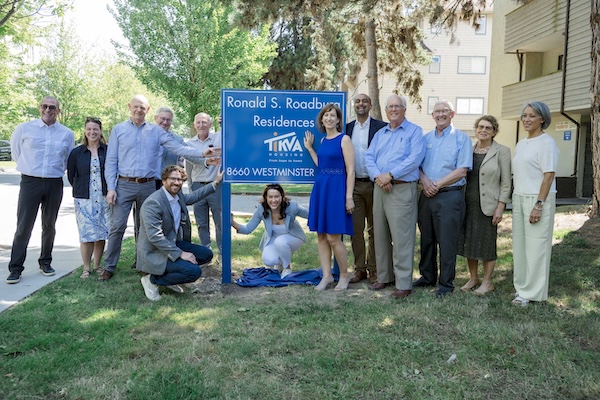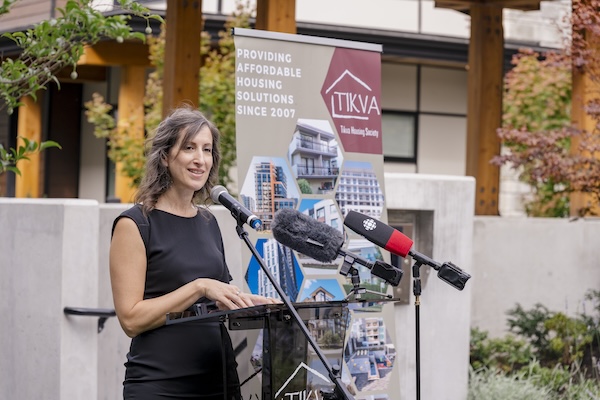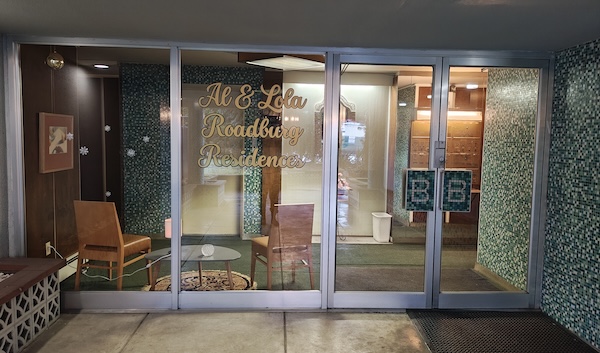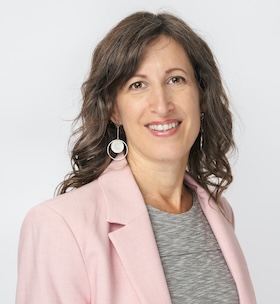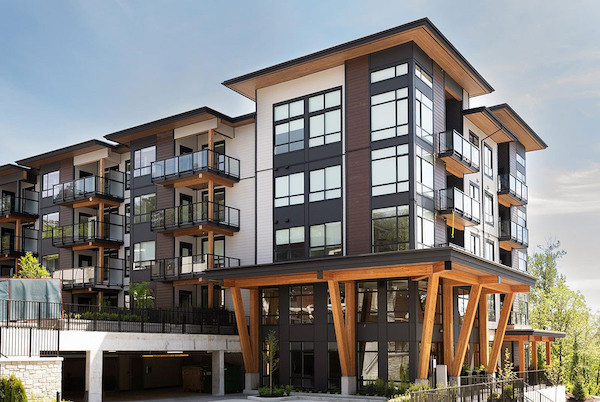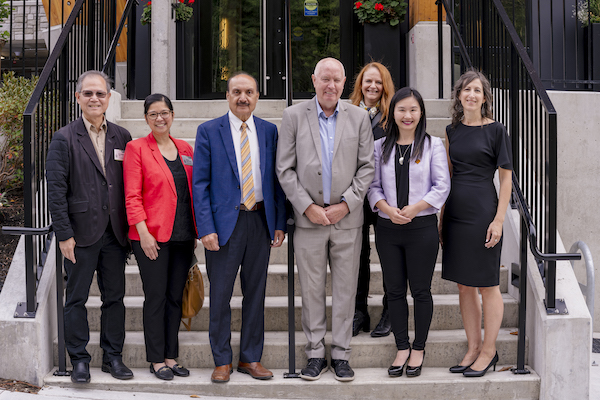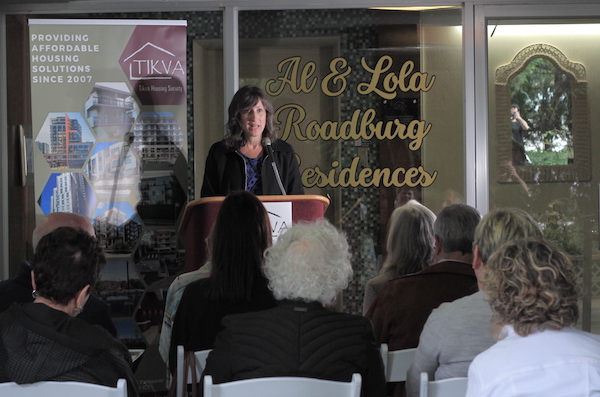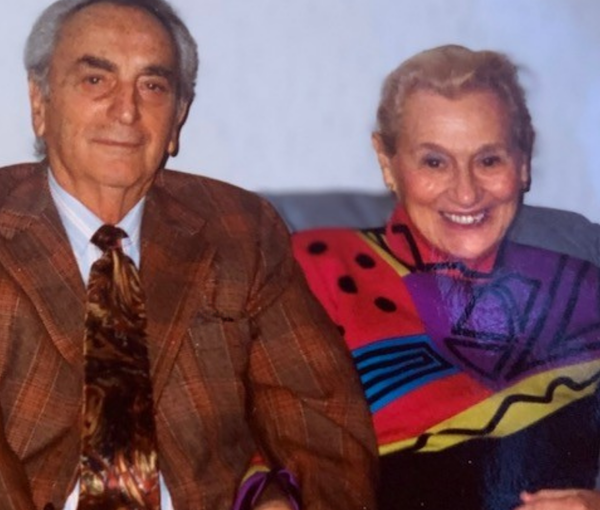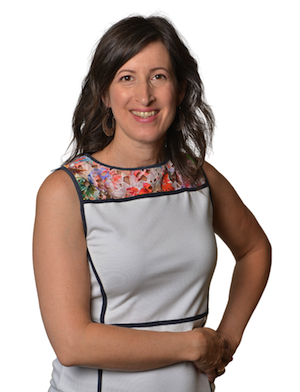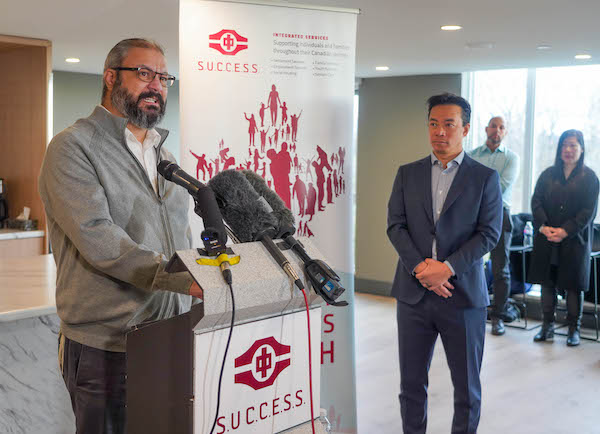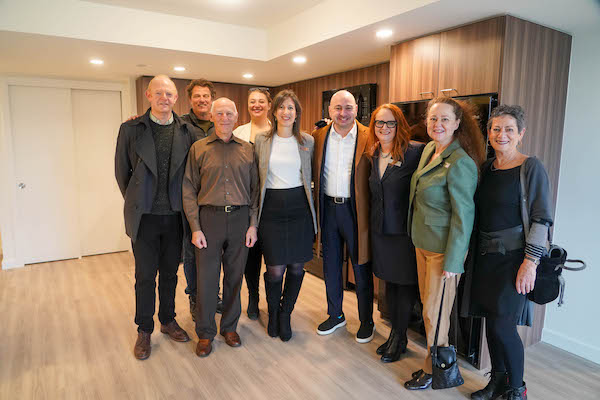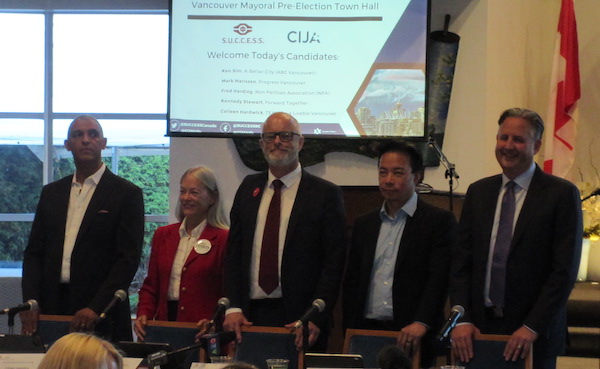Anat Gogo of Tikva Housing unveils the sign for the Ronald S. Roadburg Residences, with Tikva board co-chairs Andrew Charney and Penny Gurstein, former minister of housing and municipal affairs Ravi Kahlon, Richmond Mayor Malcolm Brodie and Richmond city councilors, and Bernard Pinsky of the Ronald S. Roadburg Foundation with staff and board members. (photo by Alina Ilyasova)
Tikva Housing has acquired a 45-unit apartment building in Richmond, now officially named the Ronald S. Roadburg Residences. The purchase marks the largest acquisition in Tikva’s history and secures 30 two-bedroom and 15 one-bedroom units as long-term affordable housing.
This acquisition was made possible through a transformational gift from the Ronald S. Roadburg Foundation and capital funding from British Columbia’s Rental Protection Fund, which enables nonprofit organizations to purchase rental housing at risk of being lost to private redevelopment.
“We’re working on every front to address the housing crisis and rising costs, so people have an affordable home in the community they love,” said Ravi Kahlon, who was at the time BC minister of housing and municipal affairs. “When a building changes hands, residents worry whether they will be forced to move or pay much higher rent. By helping nonprofits to buy these buildings, we are protecting the people who have lived there for years, close to their families, their jobs and the activities they enjoy.”
Located at 8660 Westminster Hwy., rents at the property average approximately $1,500 to $1,600, or about 42% below community averages, and will remain below local market rates, providing stability and peace of mind for more than 110 residents.
“It’s a relief that Tikva has stepped in to secure the future of the Ronald S. Roadburg building. It’s helped me set aside a nagging fear of needing to relocate due to redevelopment or similar,” said tenant Timothy Schafli. “I’m happy to have called Richmond home for over a decade and that I’m confident I’ll be able to continue to do that. Thanks to Tikva for the excellent communication during the transition as well.”
The property in central Richmond offers residents access to amenities like transit and schools, along with opportunities for individuals and families to engage in religious, cultural and social networks.
“This momentous acquisition embodies the core of Tikva’s mission to provide access to innovative housing solutions – giving new hope to individuals and families in need, transforming lives and strengthening the community,” said Anat Gogo, executive director, Tikva Housing. “We are deeply grateful to the Ronald S. Roadburg Foundation for their extraordinary generosity and to the Rental Protection Fund for ensuring these 45 homes will remain protected and affordable for generations to come.”
The building is named in honour of the late businessman and philanthropist Ronald S. Roadburg.
“Providing secure and affordable homes strengthens the entire community, and we are honoured to help make this happen,” said Bernard Pinsky, chair of the foundation.

The project also received support from the BC Rental Protection Fund. Marking its first acquisition in the City of Richmond, the fund contributed $5 million toward the purchase, helping keep housing affordable for tenants. This includes $1.2 million in renewal grants to help with building improvements to keep the homes safe and comfortable.
“Investing in protecting the affordable housing we already have means we spend less while achieving more – more capacity, more resilience, more opportunity,” said Katie Maslechko, chief executive officer of the Rental Protection Fund.
According to the Metro Vancouver Jewish Housing Registry, of its 450 applicants, 200 are specifically seeking affordable housing in Richmond.
“Today’s announcement of Tikva acquiring 45 units of rental housing at the Ronald S. Roadburg Residences is great news for Richmond residents, as these 45 units will provide much-needed rental tenure housing for seniors, families and members of the local workforce for years to come,” said Richmond Mayor Malcolm Brodie.
Tikva’s rental portfolio includes a mix of rental rates, ranging from shelter to below market and adhering to relevant provincial and federal social housing standards.
“This acquisition represents a strategic investment in long-term affordability and community stability in a region where purpose-built rental housing is increasingly scarce,” said Wei Liu, Tikva’s housing development manager.
For more information, visit tikvahousing.org.
– Courtesy Tikva Housing Society

